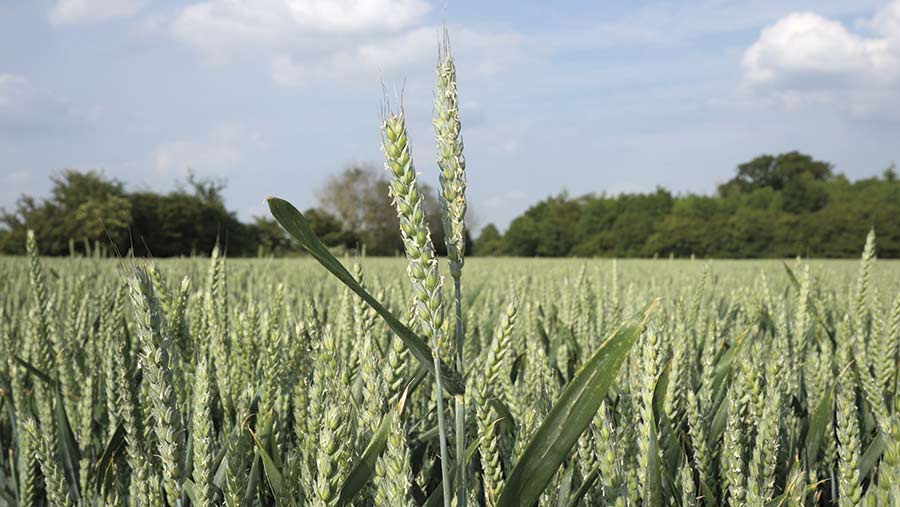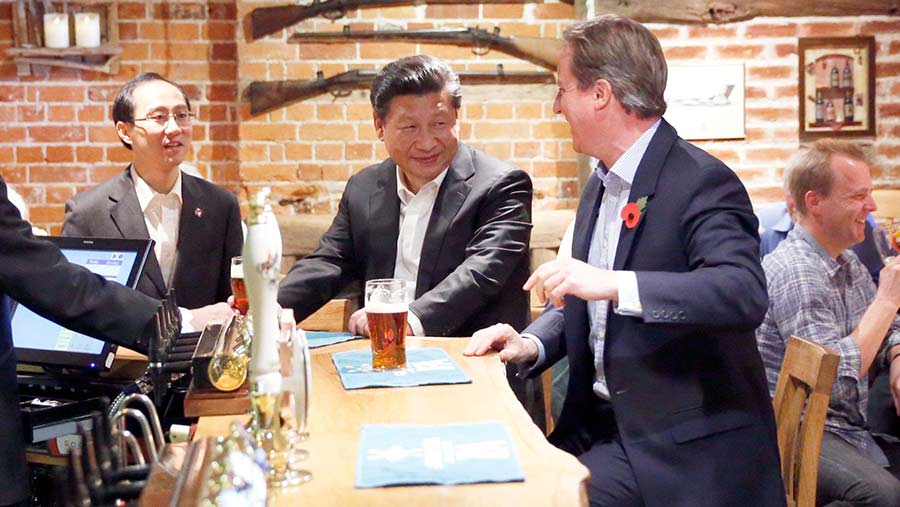Trading with China: Opportunities for arable farmers
 © Tim Scrivener
© Tim Scrivener Craft beer, Weetabix and potatoes – perhaps not what you would expect Chinese consumers to buy, but changing tastes, greater affluence and openness are creating demand for all of these.
Opportunities for British growers are certainly there and can be mainly found in malting barley, milling wheat and potato seeds.
See also: Trading with China: Opportunities for livestock producers
Growing for the Chinese market and taking advantage of niche markets for small brands are all key to making the most of what China offers.
Getting government buy-in to promote British is also critical, say industry experts and businesses.

David Cameron and Xi Jinping drinking beer © Xinhua/Rex/Shutterstock
Beer and barley
China is the world’s biggest beer market by volume, with the Chinese drinking one-quarter of the world’s beer, or 45.7bn litres last year, according to drink analyst IWSR.
Now that Chinese drinkers are starting to shun cheap local products in favour of premium, high-value imported brands, the country is the biggest market by value too.
Good-quality malting barley is needed to quench this rapidly growing demand for craft beer, which is seeing thousands of domestic microbreweries popping up, as well as a rise in imported brands.
British names currently exporting to China include Greene King, John Smiths, BrewDog, Lancaster Brewery, Samuel Smith, Marstons, Innis and Gun and Foxes Rock – and there is a real opportunity for small and medium-sized beer manufacturers, say industry experts.
The UK also exports a large volume of whisky to China and Chinese companies are making the spirit themselves.
Being able to say their whisky contains Scottish malt is a huge selling point, says Rob Burns, head of seed and export at AHDB.
“I think there is still a really good opportunity in China for malting barley,” he says.
But although UK barley has had access to the Chinese market for three years, no exporters have so far taken up this opportunity.
“I think there is the perception that China is too difficult to do,” he says, adding that Chinese buyers are growing suspicious about why the UK hadn’t yet sent any barley.
At the moment, UK cereal exports are all based on what is surplus, says Mr Burns. But the real value is in growing for a specific market.
For example, China does not allow imports of grain containing weed seeds, he says.
But until the UK has asked China to look again at the agreement governing barley exports to address such technical issues, there is little growers can do, says Dorit Cohen, export marketing executive, at the AHDB.
Wheat and biscuits
As tastes change in China, people are eating more breakfast cereals and other wheat-based foods. Weetabix and Dorset Cereals, among others, are already exporting to the country, says Antoaneta Becker at the China-Britain Business Council
While China produces most of the feed wheat it consumes, it does have a demand for milling wheat, which the UK is well placed to help satisfy, says Ms Cohen.
On a recent visit to Chinese flour mills in the south of the country, Ms Cohen said millers were very receptive and excited about the quality the UK could offer.
Soft uks milling wheat suitable for biscuit making is particularly in demand and the UK doesn’t really have a competitor, says Ms Cohen.
“What UK growers should be doing is growing more uks wheat,” she says.
Plant breeders could be helping develop more high-yielding varieties too, she says.
Westwood Ales: ‘Politicians need to promote British’

David Westwood, Westwood Ales
A key moment in helping to promote beer – and British beer at that – was when David Cameron took China’s president Xi Jinping for a pint down his local two years ago, says David Westwood, of Westwood Ales in Shanghai.
“Give a politician a pint in the UK and it doesn’t matter, but give President Xi Jinping a pint and it sells out. Politicians are like celebrities here.”
David Cameron, then prime minister, started the ball rolling, but since the EU referendum the momentum has disappeared, he says.
The opportunity for British beer in China is “massive”, but British companies are hugely underrepresented, he says, while Germany, the USA and the Netherlands are very good at promoting their brands.
“Mrs May should be focusing on China. She should be dining with President Xi Jinping,” says Mr Westwood.
He founded the company with his brother James at the end of 2013 and they sell their brew all over China now.
They set out to develop a British beer brewed in China. The company uses British or Dutch malting barley, and English hops and yeast.
“When we started there were probably four beer breweries in China and now there are 44.”
Most breweries started off brewing in the back of their own restaurants – one such company is now selling 500,000 cases.
Potatoes instead of rice
The Chinese government is on a drive to promote the consumption and production of potatoes instead of rice, says Mr Burns, since potato production requires less water and agrochemicals.
Potatoes are also being promoted as more healthy and potato-based noodles, sweets, cakes and even drinks are popping up.
At the same time, there has also been an expansion of Western-style fast-food outlets and therefore, a rise in the consumption of chips.
Both these factors have increased consumption and in 2016-17 China produced 100m tonnes of potatoes – the largest single producer in the world, according to the US Department of Agriculture (USDA).
However, yields are low because of low-quality seeds and a high incidents of blight, says a report by the USDA.
This offers Scottish potato seed growers a real opportunity, says Mr Burns. Currently most of the UK’s potato seeds go to Egypt, but “not putting all our eggs in one basket is a good thing”, he says.
The UK is not currently trading seed potatoes with China, but a protocol to allow this is being worked on.
Realistically, trade in UK potato seeds to China is not expected for another 18 months,Mr Burns says.
Opportunity snapshot
Barley
- The UK has market access to China, but the requirements, such as no weed seed, make it unappealing for UK traders to send shipments in case they are rejected on arrival. The AHDB is hoping the trading protocol will be looked at again to address such issues.
- Opportunity lies in the booming Chinese beer market for British malting barley – either for Chinese brewers, or UK brewers that could then export to China.
- British beer culture is a selling point and should be pushed by the UK government.
Wheat
- Growing appetite for wheat-based foods is fuelling demand.
- China grows a large amount of feed wheat, but has a need for milling wheat.
- The variety uks wheat hits the mark for Chinese millers – soft, biscuit-making quality, with low protein levels.
- Growers could produce more of this, while plant breeders could help with developing more high-yielding varieties.
Potatoes
- Demand for potatoes in on the rise in China, due to an increase in Western-style food, plus a promotional drive by the Chinese government to replace rice consumption with potato for health and environmental reasons.
- China produces a large volume of potatoes, but there is a need for high-quality seed potatoes.
- Scotland is well placed to take advantage of this. Trading is expected to start in 18 months or so when a protocol is finalised.
